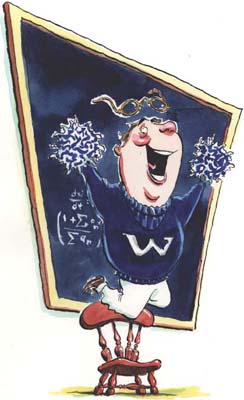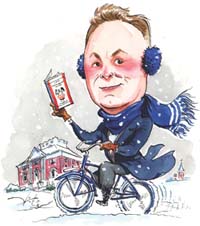 |
 |
| current issue |  |
past issues |  |
send a letter/news |  |
address update |  |
advertise |  |
about us |  |
alumni home |
Features
The Professor Who Fell Out the WindowAnd Other Stories
Page 2 of 3
 Illustration by Michael Witte, all rights reserved
Illustration by Michael Witte, all rights reserved
|
A Differential Operator
Shepley L. Ross, Mathematics
I took several courses from Professor Shepley Ross, including his introduction to differential equations, and later nonlinear differential equations and non-Euclidean geometry. Dr. Ross was a fine professor and I enjoyed all three courses. However, I especially remember the day in his differential equations course when he stood up on a chair in front of the class and gave the Differential Equations Cheer:
e to the x, dx, e to the x, dxSome things are not meant to be forgotten!
Wronskian, Wronskian
RAH! RAH! RAH!
—Douglas Vaughan '68
Every College Graduate's Nightmare
Robert Lambert, Physics
A physics major, I took an esoteric math-for-math's-sake course. After a few classes, I lost interest and stopped going, but I didn't drop the course and I even took the midterm, which I flunked. Before I knew it, final exams were upon me. The night before the final, I confessed to my most trusted physics professor, Bob Lambert, that I was flunking a math course, with the final exam the next morning. He said, "We can't have a physics major flunk a math department course. Get your book and meet me in my lab downstairs." He walked me through the entire course that night, chapter by chapter, having me solve the math problems on the blackboard. Soon it was morning and we were both exhausted. I ended up acing the final, and, as I remember, got a B for the course--thanks to Bob Lambert.
—Samuel McKay '66, '72G
Drop Anchor or Jump Ship
Mathias Richards, Dean of Agriculture
After a very good freshman year academically, in my second year I seemed to find more nonacademic diversions. In short, I wasn't doing very hot academically. I wanted to change majors, so I was transferred to Dean Mathias Richards. After agreeing that on my current course I was probably wasting my savings and education, he suggested I drop out for a couple of years and figure out what I wanted to do with the rest of my life. He assured me that I would have no problem getting back into UNH. I took his advice, dropped out and joined the Peace Corps. I wrote him from Colombia to tell him what I had done and received a very warm letter wishing me well. In the end, I did come back to UNH. Recently, I had a conversation with a classmate about people who had affected our lives in important ways. Mathias Richards will always be the one I most wish I could turn back the clock and say how much I appreciated his willingness and interest to point me in the right direction.
—Tad Runge Jr. '67
Alle alle Oops
Arthur C. Borror, Zoology
Arthur C. Borror taught ornithology, the study of birds. When the class gathered for field trips, my friend and I would casually drift towards Dr. Borror's car so we could jump in before anyone else. One stormy winter day, we went out in search of ocean birds seeking shelter close to land. As we drove along the shore, Dr. Borror suddenly spotted something on the beach. He screeched to a halt at the side of the road and grabbed his binoculars, saying, "Is that a dovekie or a beer can?" After one glance, he announced, "Clam shell. Close, Borror! You had it in the right kingdom!" With that he pulled back out onto the road and sped off, leaving the students in the cars behind us searching the beach with their binoculars and trying to figure out what rare bird we had seen.
—Roberta Humphrey Manter '75
From Soup to Nuts
Samuel Smith, Animal and Nutritional Sciences
In Nutrition 101, we spent a semester learning from Sam Smith the complicated chemistry of food, especially the kinds we should eat to be healthy. At our last class, a brave student asked him what he ate to stay healthy. His answer was simple. "I eat peanut butter sandwiches on whole wheat bread with a glass of milk."
—Carrie Keating Griffiths '87
Fuzzy Math
Catherine Craycraft Plante, Accounting and Finance
Professor Cathy Craycraft asked different members of our class what they wanted to be when we "grew up." I told her that I wanted to be an accountant. She told me to never say that. She told us all to answer, "a CPA." Certified public accountants, she said, get to do all the cool stuff. The next day she told us a joke in class to illustrate her point. It went like this. Three people showed up for an interview for an accounting position. The interviewer asked, "What is two plus two?" The first one said, "Four." The interviewer said, "We will let you know." The next guy walked in. He was asked the same question. He replied, "Five." He got the same reply. The third guy walked in. He was asked the same question. He replied, "What do you want it to be?" He was hired on the spot.
—Rob Hylen '92
 Illustration by Michael Witte, all rights reserved
Illustration by Michael Witte, all rights reserved
|
Seeing Red
Gwynne Harris Daggett, English
During my years at UNH, the country was still bogged down in a Cold War mentality. "Reds" were supposedly everywhere, especially in academia. One small, seemingly innocent action by Professor Gwynne Harris Daggett brought down the wrath of William Loeb, head of the Manchester Union Leader, and prompted the New Hampshire Legislature to consider cutting funding to the university. Professor Daggett had smuggled a banned book, Lady Chatterley's Lover by D. H. Lawrence, into the United States from Europe. He offered to loan it to students, emphasizing the brilliance of Lawrence's mind rather than the racy writing for which it was outlawed. Rumors started to fly. Surely the professor must be a communist to offer his students such radical reading. Besides, he exhibited proletarian leanings, riding a bike to class even on snowy days. Wiser heads soon prevailed. Daggett kept his job, and funding to the university remained secure.
—Nancy Bere Janus '59
(FF minus minus)
E. Howard Stolworthy, Mechanical Engineering
While some professors could intimidate students, Professor E. Howard Stolworthy was the only one I ever had who could on occasion actually terrify them. He had the watery, blue, unblinking eyes and deadpan look of a Western gunslinger, plus a quick temper and dry sense of humor. He had contributed to a textbook on thermodynamics by Lester Lichty, and he had memorized most of the book. For another Stolworthy class, Internal Combustion Engines, I had collected as many of the I.C.E. lab files as I could from upperclassmen. They made great reference material as they also included the professor's grade and comments on the back. One was beautifully typed with a great analysis. When I turned it over, it had the following grade: (FF minus minus) ! When I inquired around about the individual who submitted it, I was told that he had transferred to another college. The translation of that lab grade was: 1) You flunked this lab. 2) You flunked this course. 3) You will never pass this course as long as I teach it, and since this is a graduation prerequisite, you will never graduate in mechanical engineering at UNH. I immediately put it aside, and many hours later when I had completed my write-up, I looked at it again and discovered that the writer had plagiarized whole sections of the Lichty book.
—Joseph L. Reed '55
Easy to print version

